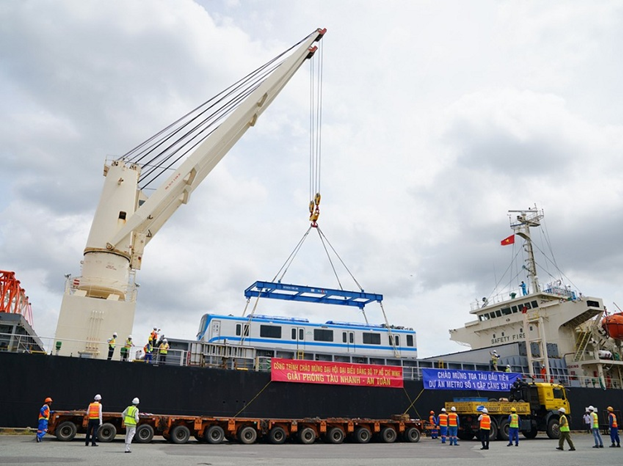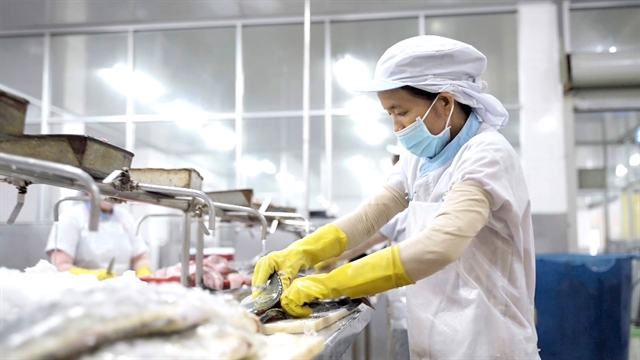 Economy
Economy

 |
| Processing seafood for export at a company in Quảng Ngãi Province. Việt Nam’s exports have gained tens of billions of dollars each year from free trade agreements (FTAs). — VNA/VNS Photo |
HÀ NỘI — The Ministry of Industry and Trade (MoIT) has disclosed that the nation's annual exports have surged by billions of US dollars, all thanks to the advantageous free trade agreements (FTAs) it has entered into as a signatory.
Statistics of the General Department of Customs showed that after nearly three years since the EU-Việt Nam Free Trade Agreement (EVFTA) took effect, export turnover from Việt Nam to the EU had experienced tremendous growth, with 14.2 per cent in 2021 and 16.7 per cent in 2022.
A study on Việt Nam's FTAs, conducted by the Center for WTO and Integration under the Vietnam Chamber of Commerce and Industry (VCCI), unveiled that nearly 41 per cent of Vietnamese enterprises have reported experiencing benefits from these agreements. The most common advantages include preferential tariffs for imports and exports, along with positive impacts on order volumes, revenue, and profitability. Although technical standards remain an obstacle in markets that have signed FTAs with Việt Nam, VCCI anticipated the agreements to maintain their effectiveness in the long run, especially once the economy regains strength and market consumption rebounds.
The MoIT emphasised that Việt Nam had successfully executed several next-generation FTAs and had even inked a historic trade deal with Israel, marking its first partnership in West Asia. This pact offers the potential to slash tariffs on Vietnamese goods by up to 92 per cent for this nation.
Despite these accomplishments, the growth rate of Việt Nam's agricultural exports to the EU has fallen below expectations. This setback is primarily attributed to the protracted COVID-19 pandemic and the ongoing Ukraine-Russia conflict. These global events have induced economic recessions and tighter spending, affecting crucial Vietnamese exports such as marine products, furniture, cashew nuts, and rubber.
Nevertheless, many businesses have started to explore opportunities in alternative markets, including Africa.
Nguyễn Ngọc Luân, CEO of the fruit coffee chain Meet More, acknowledged that tax incentives had expanded export possibilities for Vietnamese businesses.
However, according to his observation, major markets are currently grappling with recessionary pressures induced by the enduring conflict. Diminished purchasing power in markets such as the US, Australia, Russia, and the EU has significantly impacted businesses. Although several enterprises have secured contracts to export to Africa, these gains are insufficient to counterbalance declines in other markets.
Even Việt Nam's vegetable and fruit exports to the EU have encountered similar obstacles. The EVFTA has enabled Việt Nam to eliminate as much as 94 per cent of tax lines for these products, providing a competitive edge over competitors like Thailand and China.
The Vietnam Fruit and Vegetables Association representative highlighted the vast potential for Vietnamese produce in the European market, which boasts a market size of 62 billion euros, equivalent to 43 per cent of the global trade value of fruits and vegetables.
Yet, this year's growth in fruit and vegetable exports was primarily driven by China, with the countries that have FTAs with Việt Nam experiencing slower expansion. Luân stressed that while trade agreements could reduce import taxes, they failed to stimulate consumer demand when market consumption drops. Tax reductions would lose their effectiveness if customers refrain from purchasing.
To harness the full potential of these FTAs, the MoIT has recommended that the Government allocate its resources to support enterprises in maximising the benefits of these agreements. This involves collaboration between the State Bank of Việt Nam, ministries, agencies, and commercial banks to provide businesses with appropriate credit at preferential interest rates, thus enhancing their production capabilities. Simultaneously, businesses must also explore access to sustainable credit sources to swiftly adapt to escalating standards in export markets. — VNS




